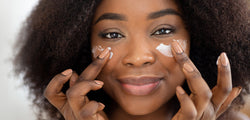
Best Oil for Hyperpigmentation - Here's How to Get Better Skin the Easy Way
Table of Contents:
When it comes to the topic of the best oil for hyperpigmentation, there's no denying that a lot of words get thrown around, namely; essential oils, natural bleaching agents, and skin lightening. And although this may sound rather unusual, evidence-based research shows that essential oils for skin lightening can effectively treat hyperpigmentation without necessarily imparting any of the usual negative side effects associated with conventional skin brighteners. Still, the process of dark spot removal oil has to be approached with a lot of caution to avoid aggravating acne-prone skin. Now, if you are wondering what is the best oil for skin whitening, then you have stumbled upon a treasure trove of useful information. We are just about to dissect the numerous options that are available as far as the most suitable oil for hyperpigmentation goes.
Black Seed oil for Skin Lightening - What are the Benefits?
It's virtually impossible to mention the best skin lightening oils in the market without black seed oil featuring somewhere within that list. Such is the potency of this essential oil that has been used in Asia, the Middle East and North Africa to lighten sun-darkened skin patches for centuries now. And not just that, there's plenty of anecdotal evidence that points towards the fact that using black seed oil for skin lightening opens up a foray of other bonus dermatological benefits such as;
- Diminished conspicuousness of fine lines and wrinkles
- Reduced severity and frequency of acne breakouts
- Unclogged pores
- Reduced visibility of dark spots from old acne scars
This essential oil, in particular, has quite a rich history that harks to the bygone eras of the Egyptian Pharaohs for more than 3300 years. In other words, this implies that the oil which is tapped from the mystical Nigella Sativa has been around the block for a while and there's a very good reason for that. And although Western beauty standards hardly appreciate its presence and contribution in the cosmetic niche, the black seed oil is precious in the East.
Tea Tree Oil for Hyperpigmentation - The Little-Known Upsides
Tea tree oil is synonymous to skin care; there's hardly any cosmetic product worth its salt that lacks this essential oil as part of its active ingredient list. So, it shouldn't come as a surprise that using tea tree oil for hyperpigmentation has been gaining quite a bit of traction over the past couple of years. This is, after all, one of the leading essential oil for dark spots that is rumored to have very few side effects on sensitive skin even when used without a carrier oil. What's more, in addition to its numerous benefits, which include a number of antiseptic and antiviral properties, using tea tree oil for dark spots has proven to be a reliable preventive measure for hyperpigmentation.

Commonly employed as a home remedy for zits and pits, there's no shortage of research that shows how its anti-inflammatory and antibacterial properties are effective at lessening the severity of numerous skin lesions. Especially those that are associated with moderate-to-mild acne breakouts that later culminate into unsightly dark spots.
Using Tamanu Oil Hyperpigmentation Formula to get Flawless Skin
The benefits of a tamanu oil hyperpigmentation approach are that you are tapping into a cosmetic potency that has been in use for thousands of years before. The Polynesians, in particular, used one of best essential oils for hyperpigmentation to treat a wide range of skin ailments starting from minor burns, acne, eczema all the way to hyperpigmentation. Nonetheless, it is treating dark spots that this oil really excels at.
You see, unlike other essential oils in this writeup, the main upside of using Tamanu oil to fade dark spots is that it contains a number of anti-inflammatory properties thanks to the presence of the Calophyllum molecule in its formulation. This molecule, in particular, is able to lessen the conspicuousness of post-inflammatory marks e.g dark spots that may be as a result of acne breaks and flare-up episodes.
That said, there are a few tamanu oil side effects that you may have to contend with including unexplained skin irritation, especially if you have very sensitive skin.
The Magic of Using Jojoba oil for Skin Lightening
The tradition of using jojoba oil for skin lightening dates back to yesteryears of America before European colonization when Native Americans discovered that oil squeezed from the seeds of the Jojoba plant had some impressive dermatological properties. The jojoba shrub, which is native to California and Southern Arizona is arguably one of nature's best-kept secrets considering the large number of anti-pigmentation skin care products that draw their potency from it.

Speaking of which, one of the best skin-lightening creams for clearing dark spots in the league - Maryann Dark Spot Corrector Cream - owes its brilliance and effectiveness to Jojoba's oil deep hydrating and long-lasting moisturization properties. Another upside for relying on jojoba oil for hyperpigmentation is that the salve contains a chokeful of vital nutrients such as vitamin B and E, in addition to a slew of minerals and antioxidants such as zinc, copper and chromium.
Exploring the Aura of Rosehip oil Hyperpigmentation
Employing a rosehip oil hyperpigmentation strategy means exploring a wide range of possibilities which also includes reducing the conspicuousness of scars from past acne breakouts. Dermatological experts believe that this is due to the presence of linoleic acid which softens the exterior of the epidermis to allow unblemished skin to replace it. Another reason that this is considered one of the best oils for hyperpigmentation stems from the fact that rosehip oil has proven to be quite effective in banishing dark-colored flat scars that are commonly associated with old acne flare-ups.
Why Using Lemon Essential Oil for Skin Lightening Should be In Your Books
There's a reason using lemon essential oil for skin lightening ranks among the top 10 essential oils for skin whitening. You see, the oils extracted from the lemon peel are known to have a high level of ascorbic acid. Vitamin C, for those who may not be in the know, is an effective skin brightening agent and a natural bleaching ingredient when deployed against dark spots. This makes the idea of using lemon oil for skin pigmentation very attractive for those who are looking for flawless skin without running the risk of dumping a barrage of toxic chemicals on their face.
Into the bargain, lemon oil contains an extraordinarily high level of enzymes and carotenoids that are responsible for brightening up one's overall complexion as well. This means if you are presently wondering whether or not does lemon oil lighten skin, then you have a clearer complexion to look forward to as well.
The Idea of Deploying Carrot Seed Oil for Skin Lightening is not that Far Fetched
The advent of the popularity of using carrot seed oil for skin lightening can be traced back to the fact that carrot seed oil has carved out a name for itself as a natural and reliable skin lightening and repairing salve. And it is easy to see why the question of does carrot oil lighten the skin is not a concern as far as the effectiveness of this salve goes. Here is the thing; carrot oil contains an insanely high amount of carotol which acts as a natural bleaching agent by evening out one's pigmentation. Besides, being one of the oils for hyperpigmentation implies that it packs some legendary anti-aging properties that have propelled it to the top of the field when it comes to nourishing and ensuring the skin's youthfulness for as long as it is humanly possible.

So, are there any side effects of carrot oil on the skin? Possibly. Nonetheless, most people should be able to tolerate it well enough provided a suitable diluting oil is used in the application process.
How to Use Sandalwood oil for Skin Whitening
There's no denying that sandalwood has a number of skin-lightening properties up its sleeve. This is the reason using sandalwood oil for skin whitening has been explored extensively in a number of fairness creams and packs. It, definitely, does not hurt that the aroma of this oil reportedly calms the mind, aids in meditation and reduces one's stress level significantly. In addition to skin brightening, sandalwood packs the following important dermatological properties that you are likely to find useful.
- Anti-inflammatory properties - Sandalwood is known for its renowned cooling and relieving effect, especially when applied on severely inflamed skin.
- Antiseptic properties - It is known to protect acne pits, sores and lesions from getting infected when used religiously.
- Deodorizing properties - This is one of the best essential oil for age spots on face when it comes down to making the skin odor-free.
- Astringent properties - Sandalwood oil is one of the select essential oil for dark spots that can make your skin tighter and ease the whole process of getting that elusive eternal wrinkle-free skin.
- Emollient properties - The oil impressively soothes skin, relieves inflammation and imparts a crucial cooling effect that is known to lessen the severity of irritation and cures common skin infections.
Using Argan oil for Hyperpigmentation to Make Dark Spots Less Conspicuous
The approach of using argan oil for hyperpigmentation mostly features in the conversation that involves reducing the conspicuousness of darkened patches stemming from mild-to-moderate acne flare ups. The only downside here is that Argan oil is not easily or readily available compared to the other essential oils for skin whitening in this article. The emollient is extracted from the kernels that are sourced from argan trees that are only found in native Morocco. That aside, you are likely to find it used as a supporting ingredient in a number of cosmetic products including conditioners, soaps and shampoos.

Using Castor oil for Skin Discoloration to Battle Hyperpigmentation
This is one easily and readily available essential oil. Hence, the logistics of using castor oil for skin discoloration shouldn't be much of a problem to most people. Using the emollient to banish hyperpigmented spots is even easier - simply massage the essential oil to the brown spots and leave it on for a couple of hours, then rinse twice. If this application is done at least twice a day, then there's a good chance of the oil helping in the evening out of one's skin tone thereby making it appear younger and brighter in the long run.
Why Rosemary oil for Skin Whitening it Catching up in Modern Times
Thanks to its powerful antibiotic and disinfectant properties, the idea of employing rosemary oil for skin whitening sounds attractive to most dermatologists. If anything, the emollient has demonstrated that it can lighten blemishes and dark spots considerably well when massaged regularly into the face. And if this is done consistently and long enough, more often than not it results in a remarkably improved skin complexion.
The Takeaway
As you can see, the notion of employing essential oil for dark spots is not as improbable or unthinkable as it sounds on paper. In fact, it remains one of the most reliable and purely natural ways of taking care of your complexion as the years roll by if you aspire to look forever young.













